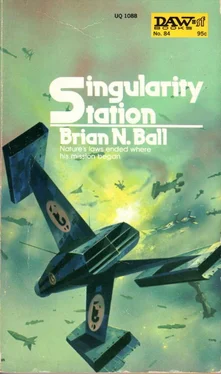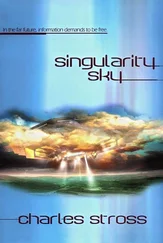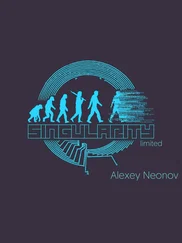“After what they’ve done, they can’t complain.”
Liz heard the edge of iron in Tup’s tone. He too was more than he seemed. A shy youth, there was resolution and authority beneath the bashful exterior.
“Well,” said Liz, with an attempt at lightness, “with that kind of rudimentary equipment they won’t be coming back.”
Tup was not smiling when he replied. “That’s the idea.”
At the entrance to the shaft that would take them up to the deck above and its grim lines of half-lit tanks, Liz hesitated. On impulse she said:
“Would you think it foolish if I said something about the cell-deck?”
“No.”
“It was the prisoner, Maran.”
“Jano Maran,” said Tup, not at all boyishly. “He worried you?”
“It was something I thought I saw.”
“Saw? Maran?”
“It was the eyes!”
Tup nodded, “It’s hard to think that they’re in a deep hypno-sleep.” Liz hesitated, feeling foolish now. But she went on with a rush: “He was watching! I’m sure he was!” Tup smiled. “Their central nervous systems are keyed into the comps. Breathing—food intake—waste products—every metabolic system is monitored. They’re held in a complex state deep below normal sleep. Getting them out of it is a long and tricky process. Each expellee has his own program for a return to consciousness. They just can’t do it on their own. Any premature awakening could be dangerous, possibly fatal They’ll be kept under until some hours before they reach the planet we’ve taken over from your Bureau. Out at the Rim. Miss Deffant, Maran wasn’t watching you. It really is impossible. Believe me?”
“Thanks,” said Liz Deffant.
They passed the rows of bobbing figures, Liz staying close to the slight figure of the young man. He was enjoying her dependence on him.
“We have complete automatic control of the expellees,” he went on, keeping to a neutral tone to show that he had no need especially to reassure her. “They feel nothing. It’s hardly necessary to monitor them, but the machines do so. We’re superfluous, really.”
“I suppose so,” said Liz Deffant. She was feeling better. The sense of oppression began to lift as they neared the next grav-chute. It would not be long before she transferred to the Messier 16 shuttle. She would not go to the cell-deck again, Liz decided.
“Ask Pete—Pete!”
The figure of the Security guard was in almost complete darkness, shadowed as he was by a bank of sensors. Tup went across, grinning.
“Aren’t we just spare parts?” he was saying, but Liz did not hear. Impelled by a compulsive curiosity, she had stopped at the tank containing the figure of the expellee Maran. It was morbid, she knew, but she wanted to make sure that she was wrong about the eyes. Those terrible eyes!
Liz looked down.
The eerie half-light played on a mottled face, a mouth wide-open, with the tongue thrusting out blackly . .
. and the eyes. Wide-open in mute appeal, but dead. Blank and dead—not unseeing, dead. And not Maran’s eyes.
Liz screamed. She knew who lay in the tank. It was the Security guard Tup had called to. She looked away, stepping backward in acute mind-reeling terror. Tup’s contorted features glared back at her. She saw big hands at his neck, holding him in a frightful clasp. Tup clawed once at the hands, and then something cracked with an abrupt, sickening finality. The hands relaxed. Tup slid toward Liz.
She knew who had killed him. The impossible had happened. It was the man from the tank: Jano Maran.
Buchanan was oppressed by his solitude. He had not yet grown accustomed once more to his burden of guilt: a residual remnant of Liz Deffant’s gentle, persistent, affectionate presence still lingered. Forget her, he told himself. Finished. Over.
He studied the information left by Kochan. That was his life now, all of it. There was no room for tenderness. He had to be as unfeeling as the automatons. Cold. Logical. Inhuman.
“I’ll check the main features and you agree if I’ve got them right,” he told the robot controller.
“Yes, Commander.”
“First, the central core of the Singularity could be a superdense form of neutron star or star formation.”
“Yes, sir.”
“If that’s so, it contains an area where the gravitational pull is a hundred billion times what would be normal on an Earth-type planet.” It was inconceivable, so much pressure.
“About that, sir.”
“The core is ultradense and stable, the crust brittle and fragile. When the crust breaks under gravitational strain the result is starquake.”
“Yes, sir.”
A tiny superdense core ground in on itself by those fantastic pressures. And then, cracking— starquake!
“And associated distortion of temporal field,” Buchanan said slowly. “Chronoclasm. The disruption of time.”
“It’s only a theory, sir. The rest is reasonably well substantiated by automatic readings over fifty years. All recorded data associates the cracking of the crust with starquake. But discontinuous temporal alignments haven’t been recorded.”
“Mainly because we wouldn’t know what to record them with,” said Buchanan.
“Quite, sir.”
“So it’s a guess,” said Buchanan, unable to accept the implications of what he had learned. “Time dislocation isn’t proved.”
“Agreed, sir. Mr. Kochan’s team saw it as a strong hypothesis but only one of several. For instance, sir, it’s predicted that the Singularity contains what’s called a ‘black hole’—an area that contracts to infinity. Again, sir, there may be a combination of such a black hole and a neutron star or star cluster. But Mr. Kochan dissented. He holds to the time-distortion elements with an illogical fervor.” Buchanan’s gaze was grim. Kochan was obsessed by an idea which was peculiarly horrifying.
“Let’s assume Mr. Kochan’s right,” he told the robot “Assume time-bending or distortion could occur within the Singularity. What projections do you have, given this?”
“Two distinct possibilities, sir. Both unverifiable.”
“How’s that?”
“The station would have to enter the Singularity to get the necessary data, sir. And that isn’t your assignment.”
Buchanan bared his teeth in a humorless grin. The robot would soon be disillusioned as to the station’s mission.
“The two possibilities,” he said.
“Yes, sir. One is that there are slight distortions locally which would give a well-known effect—a slight disjunction of the time-scale between events inside and outside the Singularity with a difference measurable in microseconds. There are certain parallels in collapsing supernova readings.” Wrong, thought Buchanan. Nothing in the experience of man in his exploration of the Galaxy would be like the interior of the uncertain regions. Whatever forces boiled up during and after a supernova, they did not begin to match the weird qualities of the Singularity’s emissions. A difference of microseconds!
“The other?”
It was the theory he had projected once Kochan’s information began to flow. He had already formed a strong opinion, but he wanted the machines to confirm his interpretation. The fearful one. The interpretation which Kochan dreaded.
“A severe dislocation of temporal patterns.”
“How severe?”
“Time would stop.”
“Stop! Stop?”
Buchanan had not gone that far. Time bent. Time flowing sidereally. Time utterly out of joint. But time stopped?
The robot waited for a minute and went on: “A most extreme possibility, sir.”
“I hope so,” said Buchanan.
He thought of the Altair Star lapsing into the strange dimensions, falling away and into that gaping black maw… all those lives. Into what?
Читать дальше












